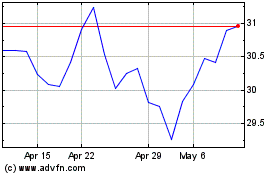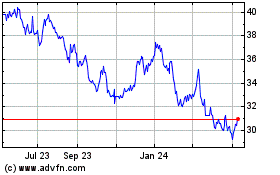Roche Gets Boost From Virus Testing -- WSJ
April 23 2020 - 3:02AM
Dow Jones News
By Denise Roland
This article is being republished as part of our daily
reproduction of WSJ.com articles that also appeared in the U.S.
print edition of The Wall Street Journal (April 23, 2020).
Demand for coronavirus testing and a potential treatment for
patients with severe Covid-19 buoyed Roche Holding AG in the first
quarter, even as the pandemic hit health-care provision in other
disease areas.
The Swiss company launched a diagnostic test for Covid-19 in
mid-March. It also produces reagents that are used by laboratories
to run their own tests for the virus, and said it had ramped up
manufacturing of those products by a factor of 10 over the first
quarter. Roche said Wednesday that those efforts offset declines in
other parts of its diagnostics business, due to hospitals
conducting fewer routine tests.
The health-care giant also benefited from soaring sales of an
arthritis drug that some small independent studies have suggested
could help patients with severe Covid-19 by damping down a
potentially fatal immune overreaction to the virus. Sales of the
drug, Actemra, surged 30% at constant exchange rates to 666 million
Swiss Francs ($677 million) in the first three months of the
year.
Most of that growth was likely due to hospitals using it to
treat Covid-19 patients, said Bill Anderson, head of Roche's
pharmaceuticals division. Roche is now running larger scale
clinical trials to determine whether Actemra is effective in severe
Covid-19 patients.
Roche said overall sales for its drugs weren't noticeably
affected by the pandemic in the first quarter, rising 7% at
constant exchange rates to 12.3 billion francs. The company stuck
with its full-year guidance, saying it continued to expect
full-year revenue to grow in the low-to-mid single digit range at
constant exchange rates and for core earnings per share to grow
broadly in line with sales.
Roche's business resulting from the pandemic could grow further,
with the company planning to launch an antibody test next month.
Such tests search for antibodies -- or tailor-made proteins
produced by the body in response to new infections -- in the blood
for signs that someone has been infected in the past. Chief
Executive Severin Schwan said he was confident that the Roche test
wouldn't suffer from the same reliability problems that have dogged
many of the dozens of antibody tests launched so far.
"It's very easy to develop an antibody test, but not so easy to
develop a precise, reliable antibody test," he said. "That's why
you see the more serious competitors who have a reputation to lose
are only now launching, because they have now validated tests."
Mr. Schwan added that in some countries testing was limited not
by the supply of testing kits or supplies, but by the availability
of the laboratory equipment and expertise needed to run the tests.
"We have many customers where we are able to increase their
capacity and provide more instruments, and they are not able to
ramp up because they don't have know-how," he said.
Countries like Singapore, South Korea, Germany and Switzerland,
which had invested in their testing infrastructure over the last
few decades, now have a "huge advantage" because they were able to
ramp up testing in response to the pandemic, he said.
Write to Denise Roland at Denise.Roland@wsj.com
(END) Dow Jones Newswires
April 23, 2020 02:47 ET (06:47 GMT)
Copyright (c) 2020 Dow Jones & Company, Inc.
Roche (QX) (USOTC:RHHBY)
Historical Stock Chart
From Mar 2024 to Apr 2024

Roche (QX) (USOTC:RHHBY)
Historical Stock Chart
From Apr 2023 to Apr 2024
